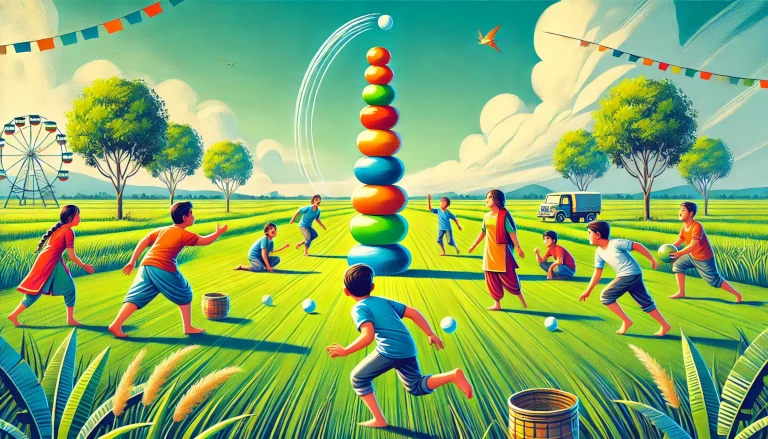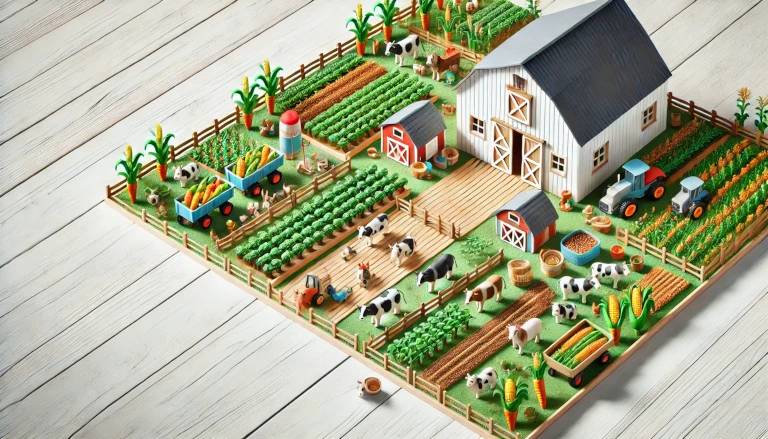In today’s digital world, where mobile games and video consoles dominate children’s playtime, traditional ancient games have gradually faded from memory. These games, once an essential part of childhood, encouraged physical activity, creativity, and social interaction. While they may seem simple, they taught important life skills like teamwork, strategic thinking, and patience.
In this blog post, we’ll explore the top 10 ancient games that have been forgotten by kids in the mobile era, shedding light on their significance and why they deserve to be revived.
1. Lagori (Seven Stones) 🪨
Lagori, also known as Seven Stones, is a team-based game involving a ball and seven stacked stones. One team tries to knock down the stones, while the other team attempts to restore the stack while avoiding getting hit by the ball. This game improves coordination, teamwork, and strategic planning.
- Tip: Lagori requires minimal equipment and can be played in any open space, making it perfect for parks or playgrounds.
2. Gilli Danda 🏏
Gilli Danda is often considered the precursor to modern-day cricket. It involves a small stick (gilli) and a larger stick (danda). Players use the danda to flick the gilli into the air and hit it as far as possible. Gilli Danda enhances hand-eye coordination and reflexes.
- Example: Gilli Danda requires no special equipment, making it accessible to children in rural areas who often use homemade sticks.
3. Pithoo (or Pitthu/ Satoliya) 🧱
Similar to Lagori, Pithoo involves stacking stones and using a ball to knock them over. Players need to rebuild the stack while avoiding being hit. This game teaches quick decision-making and agility.
- Tip: Pithoo can be played with as many players as available, making it an adaptable group activity.
4. Kancha (Marbles) 🔵
Kancha is played with small, round glass marbles. Players try to hit a target marble with their own and win marbles from their opponents. Kancha enhances precision, strategy, and focus.
- Example: Kids often played Kancha during breaks, competing to see who could collect the most marbles.
5. Pallanguzhi 🌰
Pallanguzhi, a traditional South Indian game, involves a wooden board with holes and seeds or small stones. Players distribute the seeds in a strategic way to capture more seeds than their opponent. This game sharpens mathematical skills and strategic planning.
- Tip: Pallanguzhi can be played indoors, making it a great option for rainy days.
6. Kite Flying 🪁
While not strictly a game, Kite Flying was a beloved activity that taught kids patience and control. Different regions of India celebrated kite festivals, where children competed to cut each other’s kites and maintain control of their own.
- Example: Kite flying is still popular during festivals like Makar Sankranti, but it’s not as common in everyday life.
7. Kabaddi 🤼
Kabaddi is a high-energy game that combines strength, speed, and strategy. Players form two teams, and each team takes turns sending a “raider” to tag opponents without getting caught. Kabaddi improves agility and teamwork.
- Tip: This game can be played in small groups or large teams, making it adaptable to various settings.
8. Kho-Kho 🏃
Kho-Kho is a game of tag that requires players to chase each other within a set time. It improves speed, endurance, and reflexes. The game involves running and dodging opponents, making it an excellent workout.
- Example: Kho-Kho is perfect for large groups and can be played on any open ground, even with minimal equipment.
9. Aadu Puli Aatam (Goat and Tiger Game) 🐐🐯
This ancient strategy game from Tamil Nadu represents a battle between goats and tigers. The goats attempt to corner the tigers while the tigers try to “hunt” the goats. The game requires tactical thinking and anticipation of opponents’ moves.
- Tip: Aadu Puli Aatam can be played on a simple grid drawn on paper or even on the ground.
10. Chauka Bara (Ashta Chamma) 🎲
Similar to Ludo, Chauka Bara is a traditional board game that requires dice and involves moving pieces based on the dice roll. The objective is to move all pieces to the center before the opponent. This game teaches strategy, patience, and counting skills.
- Example: Chauka Bara can be played indoors with simple materials, making it a great option for family gatherings.
Why These Games Matter 🎮
Ancient games like these are not just about fun; they promote physical health, social interaction, and cognitive development. Unlike mobile games, which often isolate players, these traditional games require players to engage with each other, enhancing communication and team-building skills.
1. Encourages Physical Activity 🏃
Traditional games involve running, throwing, and other physical movements that help improve fitness and combat sedentary lifestyles.
2. Develops Social Skills 🧑🤝🧑
Many of these games are played in teams or groups, helping children develop social skills like cooperation, leadership, and empathy.
3. Enhances Strategic Thinking 🧠
Games like Pallanguzhi and Aadu Puli Aatam require players to think strategically, boosting problem-solving skills that are useful in real life.
How to Revive Ancient Games in the Mobile Era 📲
Reviving these ancient games is essential to preserving cultural heritage and encouraging healthier lifestyles among children. Here are some ways to reintroduce these games to younger generations:
- Organize Community Events 🏞️: Schools and local organizations can host events where children can learn and play these games.
- Incorporate Them into School Curriculum 📚: Physical education classes can include traditional games, offering a break from routine sports.
- Promote Digital Versions with a Twist 🎮: Mobile apps can feature digital adaptations of these games, blending technology with tradition to engage today’s youth.
Celebrating the Value of Ancient Games in Modern Times 🎲🏆
The ancient games of India are a valuable part of the country’s cultural heritage, teaching essential skills that go beyond just play. By reviving these games, we can help children develop a balanced, active lifestyle while staying connected to their roots. Let’s bring these forgotten games back to life and help the younger generation rediscover the joys of physical play and social interaction.
Read this Marathi at मोबाईलच्या युगात विसरलेली 10 प्राचीन खेळांची यादी
Discover more from Green Ecosystem - Renewable Energy, Agriculture, and Environmental Sustainability
Subscribe to get the latest posts sent to your email.


